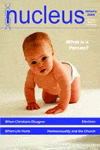Many of the arguments Christians put forward in ethical debates revolve around what we perceive as the sanctity of life. This is the intrinsic value bestowed on each of us simply because we are human and thus known and loved by God. His image stamped on us (Gn 1:26,27) is at the heart of this and not only marks us out from all other living creatures, but also imparts us with an extraordinary dignity: to kill a human is to kill one like God (Gn 9:6).
For many atheists though, man is essentially no more than a particularly clever monkey. As the article on pp10-15 explores, some secular philosophers have taken this thinking to its logical conclusion and advocate not only a new definition of what it means to be human but also a novel, radical ethic. Following this through, it's all right to abort fetuses, experiment on embryos, bump off your demented elderly relative and even to 'dispose' of handicapped newborns because all can be considered 'non-persons'. As John Wyatt explains, the Bible paints a quite different picture about what it means for us to be human. If we believe that human life is especially valuable and should be protected, we must be able to give a reason for this: understanding God's place for us in creation is vital in the current climate.
When exploring the concept of personhood or what it means for us to be made in God's image, we might try to join secular philosophers like Peter Singer in comparing humans with animals to work out conditional criteria for personhood. However, we really only need to look at Jesus (Col 1:15). He is the perfect likeness of his Father - the ultimate image of God. Our reflection of him was distorted but not completely lost at the fall. However, because of Jesus' death, Christians are being increasingly conformed by God to image him perfectly once again (2 Cor 3:18) and we are given Jesus as our pattern for living. Nowhere is this more relevant as medics than when dealing with our patients. In fact, Jesus tells us that when we deal with the sick it is as if we are dealing with him (Mt 25:31-46). On pp26-32 Tim Hinks, an SHO in Oxford, examines the age-old problem of suffering, taking Jesus' own response to events during his life on earth as a model.
Elsewhere (pp16-25), Peter Saunders, CMF General Secretary, concludes our series on how to handle disagreement between Christians. This is especially timely at the moment as the church faces increasing difficulties and divisions over issues such as homosexuality. On pp2-4, Mike Marshall refutes the accusations being levelled at evangelicals in this particular debate and offers a challenge to us all.
Many of these issues spark strong emotions in us. Have any of the articles challenged you? Why not drop us a line ([email protected]) and tell us?
































